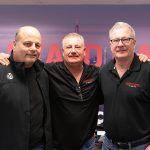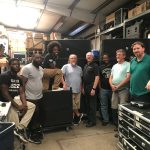In the mid-1990s, Daniel Bouchard was balancing a handful of plates on sticks, doing all he could to keep each in the air. There was a day gig at a music store, a handful of dates with his band and then there was that PA sitting in the van that needed to be loud. One day he decided to put two of those sticks down to get the PA stick swinging.
“I decided that I could make more money renting one sound system out than the other two,” the Audio East operations manager and owner reports. “The one client I had dropped me, so I went out and got another. Then the first came back and that forced me to buy another system.”
Bouchard kept those two clients — regional cover bands that were doing 90 dates a year — happy and then started to look for others. His look didn’t take long, since a promoter was looking for a full service solution in a room where national acts played. “Then I just started picking up national and international acts,” he explains.
Keeping Clients Happy
But if specialization can be a good strategic move for any business — the typical brain surgeon gets paid more than the average general practitioner — sometimes a company has to de-specialize to keep clients happy.
“I swore I would never get into lighting, but I ended up getting into it,” Bouchard says with a laugh. “Swore I’d never get into staging and now we own staging. Swore we’d never do video and now we’re doing video. We found that the organic model worked really well, as long as you can grow everything small and sub-rent it until enough clients asked for it. The whole company was built like that, piece by piece every year.”
Today, the Bouchard thinks of Audio East, first and foremost, as a production house. “I organize everything from audio to lighting, so [the client] doesn’t have to shop 10 different people,” he says. “They also have a production manager who’s going to worry about their schedule, and that’s not billed.”
Also, he believes the company’s size and service reputation gives him an edge over the larger production companies in the area — and, surprisingly enough, an edge on costs.
“They are so much bigger than we are that they can’t compete with us price wise,” he says. “So, if there is a client that’s shopping them and shopping us, we’re going to beat them by 40 percent because our overhead is so much less. But, if we’re going head to head in the sound business then it’s a lot more competitive.”
Patient, Steady Growth
Growing patiently has been one of the factors of success for Audio East, Bouchard says. The other has been the company’s Lowell, Mass. location and the willingness to travel from as nearby as Boston and as far away as Long Island, N.Y. “I don’t think this company would survive in another other part of the country,” he says. “We go to all those places a lot, and we are two-and-a-half hours from all the ski resorts, where there is a ton of business.”
The company’s reach is the basis of Bouchard’s marketing campaign. “We advertise the sound company as New England sound and lighting, even though Audio East is the name of the company,” he reports. “If you look it up online you’re going to find us [near the top]. The reason I did that is because I wanted to reach a lot of different places. So, if I could have a small piece of a lot of different pies, [I figured it was] better than just trying to work in my 50 miles radius.”
So far, that approach has paid off. “We are really starting to get strong in New York City and Long Island, because they are not so competitive down there as far as production people go,” he says. “Everything seems to be a union house and the rates are pretty locked in, so a university in New York can save $4,000 off production costs and get a better product. The downfall is that when there’s an emergency I’m out in New York having to make friends.”
A Friendly Network
Making friends, Bouchard adds, has been another important ingredient in his company’s success and growth. In fact, before he made his latest line array purchase he made a number of calls. “I made sure that I had a rental partner that I could rent another 30 or 40 boxes from with matching amps and processors to make it so that instead of me being a 16 box house, I’m a 40 box house,” he explains. “So, if my client needs way more than I have then I have the access to get it.”
The move from pure audio house to production provider was not the only change that Bouchard has made over the past couple of years. “We are now steering away from rock shows,” he explains. “There is no money in them, the gear gets treated like crap, it’s always in a substandard place and the artist is never happy because the promoter can’t give them what they want. We’re steering in a different direction with more concert series and festivals.”
The Audio East team is also concentrating on commencement business and corporate gigs for clients like Gold’s Gym in New York. “We’ll do a two day event for their trainers where we bring in a stellar production that we designed,” he says. “We take care of them and they take care of us and at the end everyone is smiling as opposed to crying because we’re loading out at 5 a.m.”
At the same time, Audio East will continue to expand its sales and install business. “Our long term success really has come because we’ve had several different kinds of incomes,” he says. “That’s been the secret of not dying, especially in times like January and February.”



